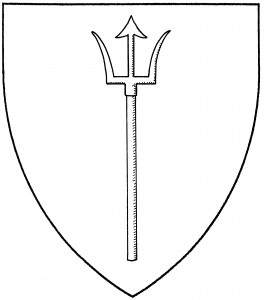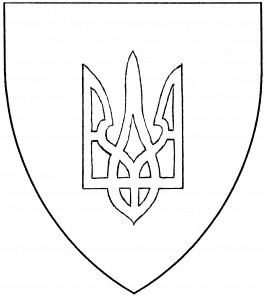A trident is a three-pronged spear, used by fishermen and Roman gladiators; in classical art, it was borne as a scepter by the sea-god Neptune. Its head resembles that of a barbed fork. The trident is a period charge, found in the arms of von Streithorst, 1605 [Siebmacher 182]. It is palewise, tines to chief, by default.
The “trident head” alone, without the haft, is also found as a charge, in the arms of von Krottendorff or Krotendorf, c.1450 [Ingeram 18; also BSB 390:854, c.1560]. It’s similar to a depiction of the “eel-spear” [Guillim1 220] or “salmon spear” [Parker 220]; but unlike those charges, the trident head, like the trident, has its tines to chief by default.
A variant form, the “Ukrainian trident (head)”, is found in the modern arms of Ukraine; tradition has made it a totem of the Rurik dynasty. For related charges, see eel-fork, pole-arm. See also weapons.
The Baron of Marinus bears: Argent chaussé ployé per pale vert and azure, a trident sable its head environed of a laurel wreath vert.
Lennán mac Neill bears: Vert, three tridents argent.
Wilhelm von Frankfurt bears: Per bend sinister azure and purpure, a trident’s head inverted Or.
Bogdan Kobzar bears: Per chevron azure and argent, two Ukrainian trident heads Or and a kobza sable.

